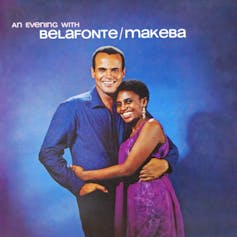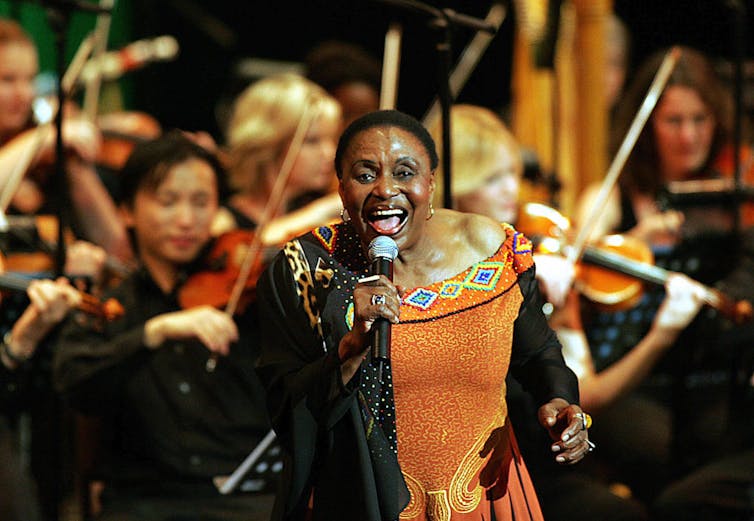South Africa’s world well-known singer and activist Miriam Makeba (1932-2008) would have turned 90 on 4 March 2022. Born Zenzile Miriam Makeba in Johannesburg’s Prospect township, she had a lifetime of outstanding world affect. She contributed to black individuals’s battle for liberation and defended the integrity of African identification and artistry whereas dwelling in a land absent of her ancestry.
Regardless of being banned from her house nation for her outspokenness and resistance to apartheid, Makeba went on to construct an illustrious worldwide profession, acting on a few of the world’s most prestigious phases. She can be celebrated – and persecuted – within the US and invited to carry out on the independence celebrations of quite a few African nations earlier than finally returning to South Africa later in life.
In commemorating what would have been Makeba’s ninetieth birthday, it’s becoming to pay tribute to her legacy of activism not solely as a black African lady typically dwelling in exile in a western society but in addition as an artist who used her craft to show and conscientise the world about Africa.
Early years
Her musical beginnings within the Nineteen Forties have been at Kilnerton Faculty, a Methodist elementary faculty the place she sang within the faculty choir. The varsity’s alumni embrace South Africa’s former chief justice Dikgang Moseneke, Professor Khabi Mngoma, a vastly influential determine in music schooling, in addition to battle icon Lilian Ngoyi.
Makeba’s break into the skilled circuit was with the singing group the Cuban Brothers. She later joined the well-established Manhattan Brothers. They sang vernacular verses over what was a predominantly American swing and ragtime sound.
She was a founding member of the well-known all-woman singing group the Skylarks. In 1952, she was solid in Alf Herbert’s African Jazz and Selection manufacturing showcasing black expertise. It was introduced primarily to white audiences besides on Thursdays when black audiences have been allowed. That is the place movie producer Lionel Rogosin noticed Makeba and persuaded her to characteristic in his controversial documentary movie, Come Again Africa.
This movie depicted the tough situations below which black South Africans have been pressured to dwell by the apartheid authorities. Makeba’s quick look attracted consideration, together with an invite to attend the movie’s premiere in Italy. Naturally, she agreed, by no means imagining that due to her position within the film she can be banned by the apartheid state from returning house, not even to bury her personal mom. This marked the start of her exile.

RCA Victor
Selling the movie in London, Makeba met African American people singer and activist Harry Belafonte. He would play a big position in her profession within the US, forming half of the duet on their Grammy-winning album An Night with Belafonte & Makeba.
Artwork as activism
Her artistry prolonged past the stage, past her impeccable vocals and her refined interpretations of worldwide and South African repertoire. Her very presence in the USA stood as a type of activism in opposition to the apartheid authorities who had tried to silence her and erase her from the consciousness of her individuals.
Makeba’s life within the US coincided with the parallel experiences of black individuals in America and South Africa struggling immense injustice, marginalisation, racism and inequality. Just like the battle in opposition to apartheid in South Africa, the Civil Rights Motion within the US was a car by way of which black Individuals protested. Tutorial Barber-Sizemore describes Makeba’s voice as being “a floor onto which Individuals projected their very own narratives about Africa and American race relations”.
Her artistry, all the time knowledgeable by the circumstances in South Africa, served as a razor-sharp consciousness instrument. In journalist Gwen Ansell’s guide Soweto Blues, the late Hugh Masekela concurs that
There’s no one in Africa who made the world extra conscious of what was taking place in South Africa than Miriam Makeba. This was due to the best way during which she described the songs…unwittingly she educated African American artists.
Makeba would describe life in apartheid South Africa when introducing her songs and would use each alternative to deal with inequality. As analysed by tutorial Louise Bethlehem, Makeba’s work resisted the apartheid state’s menace to dismantle the very place of African artwork and tradition on the planet.
African Individuals noticed in Makeba not solely what they have been but in addition the probabilities of what they might turn out to be, expressed by way of tune, dance, gown, language and beliefs. Makeba discovered commonality with artists reminiscent of Nina Simone and Abbey Lincoln, who historian Ruth Feldstein referred to as “an emergent collective of black girls performers who mixed their music with civil rights activism”.
Aesthetic as activism
What I recognize most about Makeba is the best way during which she not solely embraced however leaned into her sexuality and sensuality. The way in which she moved her physique on stage was typically provocative, drawing the viewers into her world. She understood acutely the facility of her black physique and its curvature.
Her aesthetic of pure hair and minimal make up (if any in any respect) communicated eloquently her sturdy sense of self, rooted in her African identification free from the expectations of western notions of magnificence and acceptability.
In remembering Makeba, we should guard in opposition to confining her activism to the anti-apartheid speeches she delivered on the United Nations in 1963 and 1976. Her activism was way more nuanced than that. It was interwoven in her music, her supply of melodies, lyrics and inventive sentiment. Her artistry was a lantern that burnt vigorously by way of one of many darkest eras in historical past.
A legacy spanning generations
Kenyan writer Ngũgĩ wa Thiong’o, believes that Africans singing of their native language is a world act of decolonisation and a marker of Pan African identification. Tutorial Aaron Carter-Enyi acknowledged Makeba’s affect on different African singers to sing of their mom tongues. Like Benin’s Angelique Kidjo who sings in Yoruba, Mali’s Oumou Sangare who sings in Mandinka and Nigeria’s Onyeka Onwenu who sings in Igbo.

LEXANDER JOE/AFP through Getty Photos
Makeba’s affect transcends generations to disclose itself in modern cultural practices. We’re as a result of she was. Makeba’s legacy is just too typically suffocated by the complexity surrounding her mental property in addition to her relationships with the boys in her life.
Makeba was not simply the spouse of musician Masekela or Black Panther chief Stokely Carmichael. She was not Belafonte’s “discovery from South Africa”. She arrived in America a consummate skilled match for objective.
The position of those male figures in Makeba’s life might have been significant however additionally it is grossly overstated. Makeba’s legacy is powerful sufficient to face by itself two ft. Her title wants no co-anchor. She fought extra along with her “artivism” than many a person did with their armed weaponry.
It’s time to maneuver past her widely-adopted nickname “Mama Africa”. Makeba was a stalwart and an icon of African liberation and identification. Her legacy carved the best way for future generations to dwell a lifetime of authenticity, fearlessness and bravado.




